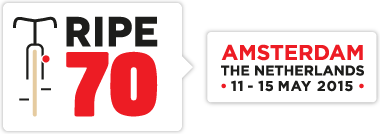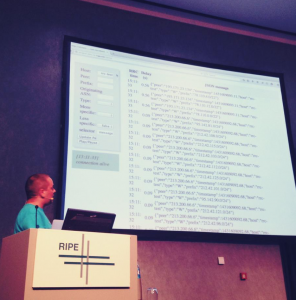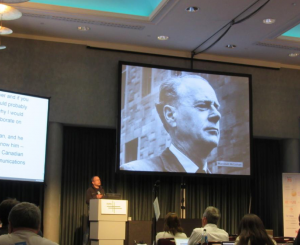Monday, 11 May
Attendees checked in so far: 522
We had more attendees checked in by the end of Monday than ever before! This looks to be another huge, record-breaking meeting. To top it off, the weather was unusually warm and beautiful by Amsterdam standards…What an auspicious start to the meeting week!
The morning started with parallel tutorials: Get Your Hands Dirty with BGP, Hands-on DNSSEC with DNSViz and LISP (Locator/ID Separation Protocol).
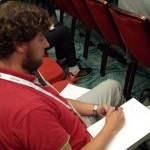
A first-time RIPE Meeting attendee takes the RIPE Meeting 101 quiz.
Before lunch, first-time RIPE Meeting attendees took a course in “RIPE Meeting 101” with RIPE Chair Hans Petter Holen and RIPE NCC Managing Director Axel Pawlik at the Newcomers’ Introduction session. At the end of the session, the newcomers took part in a quiz to test their RIPE and RIPE NCC knowledge.
Empty seats filled up quickly after lunch with few seats to spare in the Main Room when the Opening Plenary started at 14:00.
Highlights of the Opening Plenary included:
- A welcome by RIPE Chair Hans Petter Holen
- An overview of the evolution of Ethernet speeds
- BIER (why yes, that is the Dutch spelling of beer, as several attendees noted on Twitter – but in this case it refers to Bit Indexed Explicit Replication)
- How to make route servers aware of data link failure at IXPs
- A presentation on SDN, jokingly referred to as “Still Don’t kNow”, emphasised the importance of automation and made the point that, “technology is an enabler, not a solution”
Monday’s lightning talks garnered a lot of attention. The first highlighted the Internet Traffic Statistics Archive and the second, titled “The 1000 Dollar Internet Exchange”, encouraged everyone to build a community first, and then scale up. In the second plenary session, RIPE Atlas users were given a sneak peek of what the new streaming architecture can do for them, the need for better cryptographic standards was highlighted, and the last lightning talk of the day looked at Internet standards.
 The day wrapped up with a BCOP Task Force session and a tutorial on the advanced use of RIPE Atlas.
The day wrapped up with a BCOP Task Force session and a tutorial on the advanced use of RIPE Atlas.
All the presentations, and webcasts for the plenary sessions, are available online.
Attendees had the chance to meet and discuss things with the RIPE NCC Executive Board before catching up with old friends and meeting new acquaintances at the welcome drinks.
Tuesday, 12 May
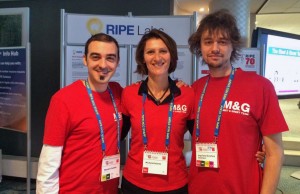
Massimo, Michela and Inigo – part of Meet & Greet at RIPE 70
Attendees checked in so far: 589
It was a busy morning with more than 500 people already checked in before midday. Luckily our friendly Meet & Greet Team were ready and waiting to welcome first-time attendees.
Highlights from the morning plenary sessions included:
- Cisco’s Michael Behringer on the advantages of creating a“virtual” out-of-band channel with an autonomic control plan, and a round of applause when he announced that his network is IPv6-only.
- An explanation of how to secure routing headers for segment routing in light of the fact that about 30% of packets are dropped on the Internet, often because of issues with headers.
- Ólafur Guðmundsson on CloudFlare and the potential to make changes in the DNS without having to go through a registrar. He’s looking for partners to help roll out this idea with ccTLDs.
- Job Snijders’ proposal for an “IRR Lockdown” got bums out of seats and up to the mics to discuss the pros and cons of his idea.
- Chris Grundemann on why network operators need to get involved with the IETF and how the IETF is working to improve its inclusivity.
Highlights from the afternoon plenary sessions:
- Bart Braem illustrated how to build a community network using volunteers, funding partners and the community.
- Jim Cowie, Dyn, highlighted some of the potential pitfalls of IPv4 transfers. He included some interesting figures, like the fact that 33% of the ~4,500 prefixes originated in Saudi Arabia were Romanian a couple months ago.
- Bendert Zevenberger aimed to raise awareness among RIPE community members on the importance of balancing the goals of research and the potential negative consequences of the research results.
- Nominees presented themselves for the two available seats on the RIPE Programme Committee
- Benno Overeinder and Andrei Robachevsky initiated an engaging discussion on building a secure and trusted Internet.
- Representatives from the RIPE CRISP team gave updates on their participation in IANA transition discussions, identified potential risks for the future of the transition, and fielded questions from the community on what the future might look like.
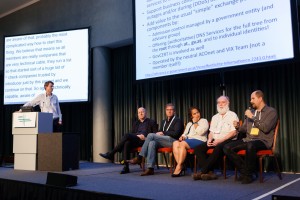
Panel discussion: Building a More Trusted and Secure Internet
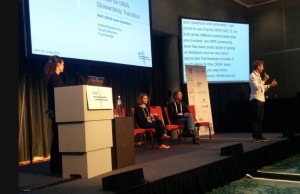
Paul Rendek, RIPE NCC, discusses IANA stewardship transition
Post-plenary sessions: RACI and a BoF
The RACI attendees took the spotlight in the Main Room following the final plenary session of the day. Four of the six RACI attendees shared their research:
- Augmented SEND: Aligning Security, Privacy, and Usability – Ahmad Alsadeh, Birzeit University/Electrical and Computer Engineering Department
- Secrecy vs. openness – Internet security communities and the open source production model – Andreas Schmidt, University of Delft
- COMIQUAL: Collaborative Measurement of Internet Quality in Lebanon – Marc Ibrahim, Saint Joseph University of Beirut/Electrical Engineering Department
- On the Diversity of Interdomain Routing in Africa – Roderick Fanou, IMDEA Networks Institute, UC3M
The other two RACI attendees share their work in different sessions. Alexandra Permyakova from the Faculty of Business Informatics, National Research University – The Higher School of Economics will present “Internet Governance and Regulation: A Russian Viewpoint”on Thursday in the second Cooperation WG session. Martijn Hoogesteger, University of Twente, presented “ITSA: Internet Traffic Statistics Archive” yesterday in a plenary lightning talk.
Over in the Side Room, Job Snijders continued the discussion on IRRs in his BoF “Cross-registry Authentication for IRR Data”.
Off to the Beach
After the long day of sessions ended, first-time attendees mingled with RIPE Working Group Chairs, the RIPE NCC Executive Board and the Meet & Greet Team at the Newcomers’ Welcome Drinks. Then it was off to the beach for a Party at Strand Zuid, sponsored by Addrex.
Wednesday, 13 May
Attendees checked in so far: 636
Wednesday was the first full day of RIPE Working Group sessions. Here are the day’s highlights:
Address Policy Working Group – Sessions I and II
- A discussion on Job Snijders’ proposal to remove the multi-homing requirement on ASN assignments; the focus was on ensuring there was an adequate “garbage collection” mechanism to return unused ASNs and to prevent future hoarding.
- A discussion on a proposal to put a 24-month holding period in place before /22 IPv4 allocations from the RIPE NCC could be transferred.
- Alexander Brinkmann’s presentation via Skype on a proposal to allow the RIPE NCC to evaluate larger IPv6 allocations for special cases.
- A discussion on IPv6 addressing approaches in very large organisations, which touched on the nature of Internet number resources and to what extent they are truly global vs being bound by geographical jurisdictions.
- In the (abridged) open policy hour, Erik Bais discussed his unified transfer policy that would apply to all Internet number resources and Elvis Velea and Radu-Adrian Feurdean gauged the community’s interest in a proposal to allow LIRs to request additional IPv4 space from the last /8.
DNS Working Group – Session I
- Anand Buddhev and Romeo Zwart from the RIPE NCC presented a status update and announced that the RIPE NCC is accepting new requests from organisations interested in hosting a K-root node, starting today.
- Jan Včelák presented on KNOT 2.0 and showed new features, like how to do DNSSEC with KASP.
- Olafur Guðmundsson explained why he likes ECDSA in DNSSEC and sees it as the way forward.
Connect Working Group:
-
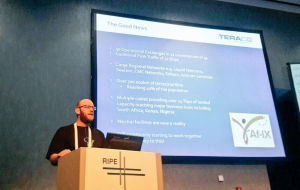
Andrew Owens talks about peering innovation in Africa
Kurtis Lindqvist gave an overview of the IXP Topography Project, citing some interesting stats like the fact that 76% of IXPs are membership based, academic or not-for-profit.
- Florence Lavroff gave a progress report on the CDN best practices document.
- Bijal Sanghani shared some insight into how EURO-IX’s support program works.
- An interesting glimpse into the inner workings of ISOC’s IXP Toolkit and best practices document from Jane Coffin, including some interesting logistical challenges of getting equipment into some countries (customs charging 10k to get a switch into Egypt and Bolivia customs thinking Raspberry Pis were spy devices).
- Innovations in peering in Africa were presented by NAPAfrica’s Andrew Owens: 700 km of terrestrial fibre in Africa reaches over 40% of the population and although the cost of bandwidth is still costly, the price is rapidly dropping.
MAT Working Group:
- The latest RIPE Atlas features, including real-time data streaming, two new measurement types (NTP and TLS), probe tagging and more. Emile Aben got a round of applause for his “IXP-Jedi” tool, which lets users map traffic through IXPs, while Robert Kisteleki gave an impromptu demonstration of RIPE Atlas’ view of the Internet outage in Amsterdam from earlier in the day.
- BGP Stream, a software framework for the historical analysis and real-time monitoring of BGP data, garnered interest from many of the attendees. The project is a work-in-progress, with the first version expected this summer.
- A different approach to gathering data on end users by using Google ads, tagging by economy, ASN, IPv4 to IPv6 relationships and capability to produce useful graphs, tables and reports about Internet use around the globe.
Anti-Abuse Working Group:
- Brian Nisbet was re-elected as the Anti-Abuse Working Group Co-chair.
- A policy proposal to clean up historical “abuse-mailbox:” attributes was discussed and, because it impacts this working group directly, it will be closely followed.
- A presentation about mapping out cybercrime infrastructure.
RIPE NCC Services Working Group:
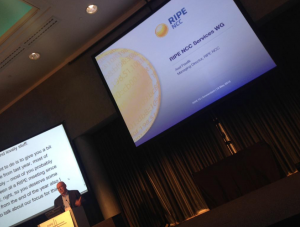
RIPE NCC Managing Director Axel Pawlik at the RIPE NCC Services Working Group
- RIPE NCC’s Managing Director Axel Pawlik gave an update on the organisation’s membership growth, an overview of its financial situation, IPv4 transfers, and the main focus points for 2015, including maintaining a strong registry, outreach activities, and improving services and efficiency.
- An update on the RIPE NCC’s external relations efforts at their offices in Amsterdam, Moscow and Dubai, as well as the current Internet governance landscape.
- An update on the RIPE NCC’s technical services, including RIPE Atlas, the global Internet measurement network; RIPEstat, the source of Internet address space information; DNS operations and plans to expand the K-root network for organisations interested in hosting their own node.
- The redesigned RIPE NCC website, which was based on feedback from members and the wider community, and focuses on providing a more intuitive navigational structure, better search functionality, and a more modern, clean look.
Thursday, 14 May
Attendees checked in so far: 661
IPv6 Working Group – Sessions I & II
- Eric Vyncke gave a presentation on HTTP State Management (i.e. cookies) in an IPv6 world, which attracted a short discussion afterwards about how this problem could potentially be solved.
- Wilhelm Boeddinghaus spoke about use cases for IPv6 extension headers, followed by a long discussion about the pros and cons of filtering packets with extension headers and whether one should distinguish between different headers rather than filtering them all.
- Christopher Werny and Enno Rey spoke about operating behaviour in contradicting environments and recommend looking at RFC 3439, “Some Internet Architectural Guidelines and Philosophy”.
- Aaron Hughes gave an interesting overview of issues ISPs face today when deploying IPv6.
- Geoff Huston showed that only 30 providers are responsible for providing connectivity to 94% of the world’s IPv6 users.
- Nathalie Trenaman shared the fact that more than 400 RIPE NCC members stopped announcing their IPv6 prefixes, wondering what happened and what the reasons are.
- The IPv6 WG called for development of more enterprise-focussed Best Current Practice documents.
DNS Working Group – Session II
- Marek Vavruša presented a work in progress implementation of a new DNS resolver. It uses a layered approach and every layer can be replaced and dynamically influenced by LUA scripts.
- Marco Prause discussed how they were efficiently transferring the .de zone over long distance, high packet loss connections. They got the best results by switching the TCP congestion control algorithm to tcp-hybla.
- Ed Lewis discussed planning efforts for the root zone’s KSK roll over.
- Geoff Huston shared results of measurements on how potential bigger packet sizes affects resolvers and/or end users.
Open Source Working Group
- Dr. Thomas King gave a presentation on jFlowLib, a library that is able to read and write sFLow and IPFIX data in the format coming from Force10 and Alcatel Lucent boxes.
- Gianni Antichi presented on a community-owned platform for high-performance and low-cost network testing, with a lively discussion unfolding afterwards.
- After Patrik Wallström presented on Zonemaster and Steven Barth talked about the latest developments in OpenWrt, the session concluded with three lightning talks.
Routing Working Group
- Yasuhiro Ohara introduced a new tool, bgpdump2, for the analysis of bgp table dumps.
Several members in the room expressed gratitude for the RIPE NCC’s RIS service, and urged the RIPE NCC to finish development of the next generation RIS architecture and deploy it as soon as possible.
Cooperation Working Group – Sessions I & II
- The first session included various discussions of network neutrality, with speakers giving updates on the European situation, recent developments in the U.S. and the mobile industry perspective.
- Ben Zevenbergen’s recounting of the horse-trading that led to the Dutch government’s adoption of net neutrality legislation was a highlight.
- The second session included discussions on privacy, human rights in code, regulatory developments in Russia (from RACI attendee Alexandra Permyakova), and an update on the WSIS+10 preparations and what they mean for the RIPE community.
- Maria Häll closed the session noting that she will be stepping down as Cooperation Working Group Co-Chair after seven years.
Database Working Group
- There was a lively discussion on the use of passwords on RIPE Database updates via email, followed by Tim Bruijnzeel’s presentation on the RIPE Database.
- New proposals were discussed, including changes to orphaned
objects and changes to the “source:” field. - Other new proposals were discussed, including changes to orphaned
objects and changes to “source:” - Job Snijders presented on the results of the IRR data BoF
Following a full day of Working Group sessions, attendees travelled by canal boat to the Maritime Museum for a night of dinner, dancing and even a tour of an authentic VOC ship!
Friday, 15 May
Total number of attendees checked in: 678
NRO/RIR Reports
The final day of RIPE 70 began with an update on the Regional Internet Registries, the Number Resource Organization’s activities, the Internet Assigned Numbers Authority (IANA) and a report on ICANN accountability.
Highlights from the RIR updates include:
- ARIN’s announcement that the RIR now has .19 of a /8 of IPv4 left outside of the reserve pool
- AFRINIC’s development of a new Whois database, the creation of two new departments, and upcoming board elections
- LACNIC’s prediction that their IPv4 space will be exhausted by February 2016
The NRO update highlighted the fact that LACNIC and the RIPE NCC are now allocating the most IPv6 address space of all the RIRs.
Athina Fragkouli gave an update on the CCWG on Enhancing ICANN Accountability and noted that the group is waiting for comments on the draft proposal, which has now been published.
Closing Plenary
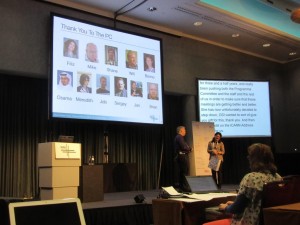
RIPE Chair Hans Petter Holen thanks RIPE Programme Committee Chair Filiz Yilmaz during the closing plenary
The final meeting session started with the announcement of the RIPE Programme Committee election results. Congratulations to Shane Kerr and Benno Overeinder, who were re-elected to the committee. Filiz Yilmaz announced that she would be stepping down as RIPE Programme Committee Chair after RIPE 71.
Sander Steffann presented interesting results about IPv6 deployment in Saudi Arabia during a lightning talk, and Menno Schepers gave the RIPE 70 technical report, which showed an interesting spike in connectivity during a special off-agenda social event.
RIPE Chair Hans Petter Holen gave the closing remarks and announced that there were 678 attendees during the week, making RIPE 70 the largest RIPE Meeting to date. This included 200 first-time attendees.
The meeting concluded with an invitation to attend RIPE 71, which takes place 16-20 November 2015 in Bucharest, Romania.
